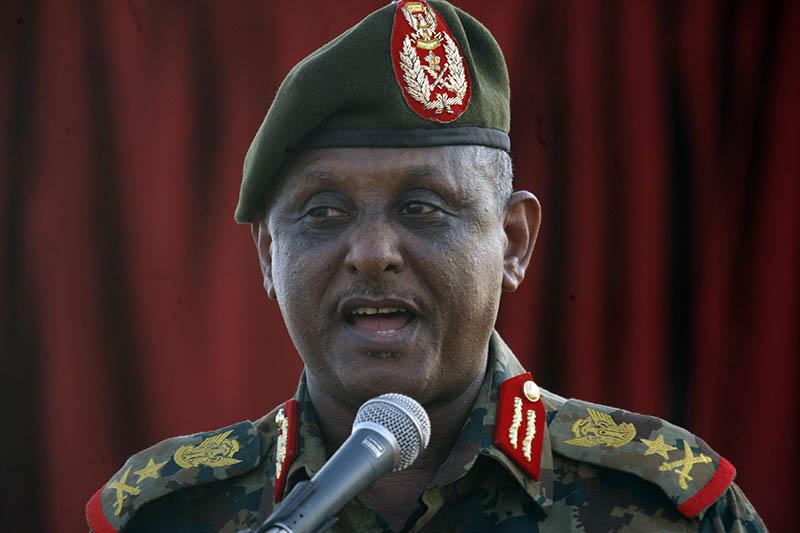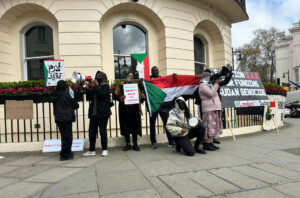Sudan general accuses ‘mafia state’ Emirates of supplying RSF

The Deputy Commander-in-Chief of the Sudan Armed Forces (SAF), Lt Gen Yasir El Atta (File photo: SUNA)
Lt Gen Yasir El Atta, member of the Transitional Sovereignty Council and Deputy Commander-in-Chief of the Sudan Armed Forces (SAF), has unleashed harsh criticism against the United Arab Emirates (UAE) and other countries he accused of supporting the paramilitary Rapid Support Forces (RSF). Former Sudanese ambassador Jamal Ibrahim criticised the public nature of the accusations, advocating for diplomatic channels and concrete evidence in handling such sensitive matters.
In a (subsequently redacted) video recorded at the Military Intelligence Command in Wadi Sedna base* north of Omdurman yesterday, Lt Gen Yasir El Atta labelled the UAE as “a mafia state that loves ruin and walks in the footsteps of evil”. The second in command to SAF and junta leader Lt Gen Abdelfattah El Burhan did not spare criticism for officials in neighbouring countries, describing them as “corrupt” and warning against the consequences of supporting the RSF.
Lt Gen El Atta had been besieged at the base of the Corps of Engineers in Omdurman since the outbreak of the war on April 15. As reported by Radio Dabanga on Monday, he was able to transfer to Port Sudan after reaching the SAF-controlled Wadi Sedna military base.
El Atta pointed fingers at “powerful, bribed politicians who accommodate Emirati planes supplying the RSF with necessary resources through multiple airports”. These airports allegedly include Entebbe Airport in Uganda, an airport in Central African Republic, Amdjarass Airport in Chad, and N’Djamena Airport in the Chadian capital. He further accused the RSF of fighting alongside mercenaries from eight countries “hailing from Chad, Mali, Niger, Central Africa, Burkina Faso, South Sudan, Ethiopia, and from Libya via the Russian Wagner Group”.
In their 2021 annual report to the Security Council, the United Nations Panel of Experts on Sudan concluded that Sudanese mercenaries in Libya, funded by the UAE, represented the main source of income for most of the armed movements in Darfur for that year.
The SAF second commander issued a warning to any country supporting “the RSF rebellion”, reminding them of the Sudanese intelligence services’ “capacity to resist such enemy efforts”. He extended appreciation for Russia’s efforts to dismantle the mercenary Wagner Group. El Atta also expressed gratitude to the Tripoli government in Libya for supporting Sudan, but cautioned the Benghazi government, led by Maj Gen Khalifa Haftar, against “meddling in Sudan’s security and stability”.
At the end of July, the British government sanctioned three Sudanese companies, M-Invest, Meroe Gold, and El Solag Mining, accusing them of constituting a “front for the Wagner Group”.
‘Haphazard allegations’
Amidst controversy regarding El Atta’s comments, the official SAF social media channels withdrew the original video and reposted a version omitting direct accusations. However, the recorded speech had already spread widely on various social media platforms.
Reacting to the speech, retired ambassador and former spokesperson for the Sudanese Ministry of Foreign Affairs, Jamal Ibrahim, told Radio Dabanga that such explicit attacks against a country, “whether a brotherly nation or a foreign entity”, should be handled through conventional diplomatic means. He argued that accusations of meddling by foreign countries, supporting the RSF against the SAF, are significant and “should be addressed away from the media”.
According to Ibrahim, the proper course of action is to “send a diplomatic message as the first step, followed by the withdrawal of the Sudanese ambassador and, if necessary, the expulsion of the ambassador of the implicated country”. He stressed that diplomatic affairs should not be handled through “unjustified statements” and that any accusations should be supported by concrete evidence, which, in his opinion, had not been provided.
The former ambassador urged leaving foreign relations to the Ministry of Foreign Affairs for “logical and rational discourse, avoiding haphazard allegations in the public domain and through the media”.
*The military base and airfield at Wadi Sedna, which has remained under SAF control, and played a strategic role during the international evacuation of foreign nationals from Sudan following the outbreak of the war.











 and then
and then